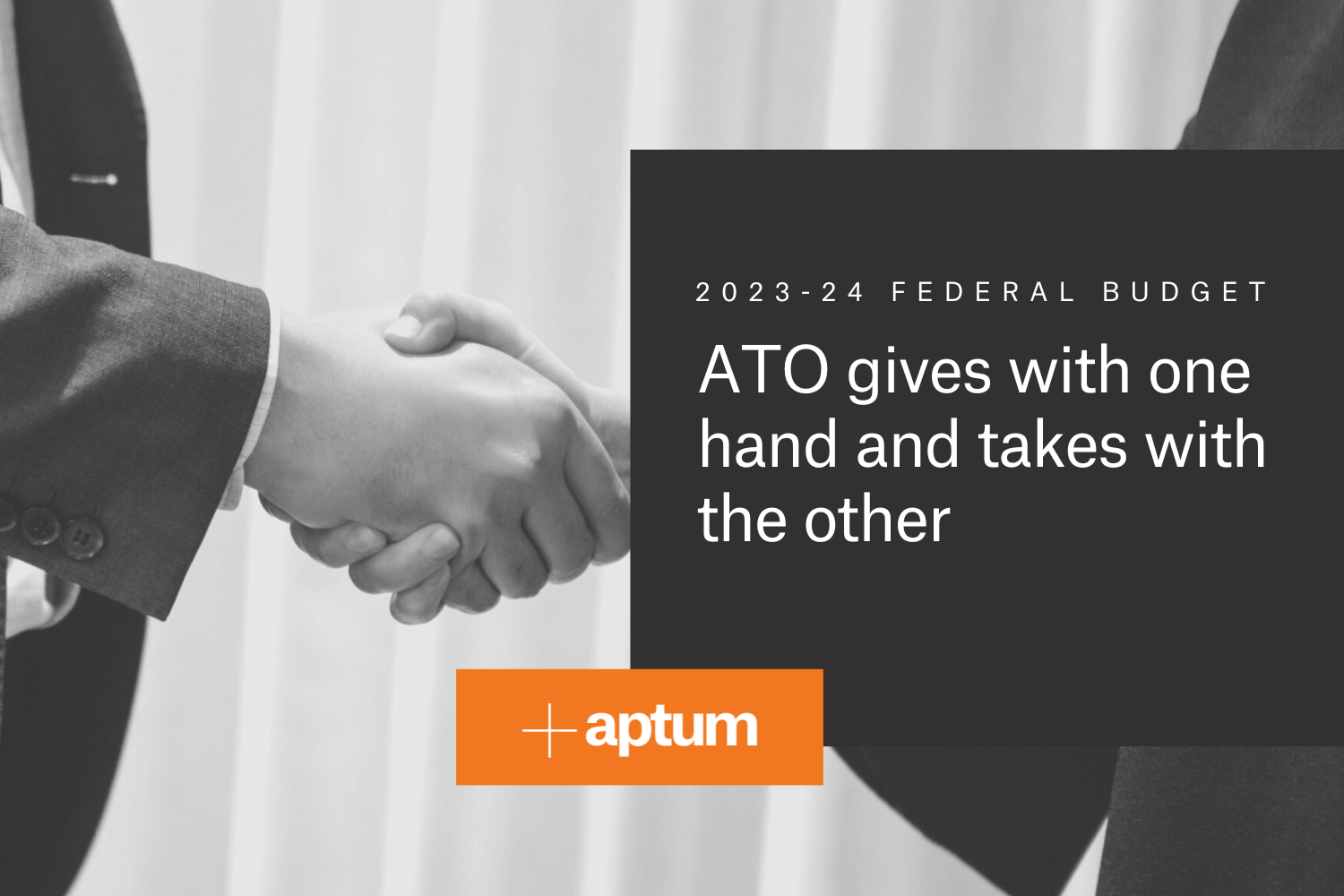The Great Seal of the United States pictures an eagle casting its gaze towards an olive branch in one hand, with a bundle of 13 arrows clasped in the other. It symbolises the US Government’s preference to pursue peace, whilst equally remaining prepared to defend itself when required.
The Australian Government’s arming of the ATO with increased funding in the 2023-24 Federal Budget appears to take a similar tact.
The ATO’s ‘olive branch’ is a lodgment penalty amnesty program. However, the ATO is well set to defend the Government’s revenue base with funding to facilitate engagement with taxpayers with high value debt and the expansion of the general anti-avoidance rules – it’s 13 arrows.
Against a backdrop of local economic pressures and global geopolitical turmoil, the 2023-24 Federal Budget announced a modest surplus – the first in 15 years. This is an improvement on the fiscal position from last year’s October Budget, largely due to much higher tax receipts than previously assumed, which the Government appears determined to maintain.
The Olive Branch
ATO lodgment penalty amnesty program
A lodgment penalty amnesty program is being provided for small businesses with aggregate turnover of less than $10 million, encouraging re-engagement with the tax system.
The amnesty will remit failure-to-lodge penalties for outstanding tax statements lodged in the period from 1 June 2023 to 31 December 2023 that were originally due during the period from 1 December 2019 to 29 February 2022. This provides taxpayers an opportunity to catch up on late lodgments without penalty.
This will be of note to directors, with a failure to lodge on time typically resulting in the issue of a lockdown Director Penalty Notice (DPN), which requires the payment of a penalty or statutory defence.
The 13 Arrows
ATO funding to facilitate engagement with taxpayers with high value debt
The Government will provide:
- $588.8 million to the ATO over four years from 1 July 2023 to continue the GST compliance program and develop more sophisticated analytical tools to target risks to the GST system
- $89.6 million to the ATO and $1.2 million to Treasury to extend the Personal Income Tax Compliance Program for two years from 1 July 2025 and expand its scope from 1 July 2023
- $82.1 million to the ATO over four years to facilitate engagement with taxpayers who have high-value debts over $100,000 and aged debts older than two years where those taxpayers are either public and multinational groups with an aggregated turnover of greater than $10 million, or privately owned groups or individuals controlling over $5 million of net wealth, and
- $1.9 million over two years from 2023-24 to establish a public registry of beneficial ownership of companies and other legal vehicles, including trusts.
Of note is the increased funding to the ATO to facilitate engagement with taxpayers with high-value debts.
A business’ tax debt may be reported if there is a lack of engagement with the ATO to manage the tax debt. As such, taxpayers with high value debts should ensure compliance with ATO payment plans, or that steps are being taken to dispute the debt.
Expansion of the general anti-avoidance rule from 1 July 2024
The general anti-avoidance rule for income tax contained in Part IVA of the Income Tax Assessment Act 1936 (Cth) (Part IVA rules) will be expanded so that it can apply to:
- schemes that reduce tax paid in Australia by accessing a lower withholding tax rate on income paid to foreign residents, and
- schemes that achieve an Australian income tax benefit, even where the dominant purpose was to reduce foreign income tax.
This change will apply to income years commencing on or after 1 July 2024, regardless of whether the scheme was entered into before that date.
The expansion of the Part IVA rules are the ATO’s ‘13 arrows’. Part IVA is Australia’s general anti-avoidance rule. Broadly, it can apply to schemes carried out for the ‘dominant purpose’ of obtaining a ‘tax benefit’. Where Part IVA applies, the Commissioner can make a determination to deny the ‘tax benefit’.
This measure will apply to income years commencing on or after 1 July 2024, regardless of whether the scheme was entered into before that date.
Whilst there are not as many Part IVA cases before the courts as in years past (as many are resolved on factual matters) there are still technical issues within the Part IVA rules yet to be litigated. The expansion of the Part IVA rules will increase the importance of assessing evidence and carefully documenting commercial reasons for cross-border arrangements and restructures.
Aptum can assist with:
- responding to DPNs within statutory deadlines or with statutory defences where appropriate;
- applying for a release of debt or actively disputing a decision or assessment that relates to debt;
- documenting commercial reasons for cross-border arrangements and restructures; and
- reviewing systems and processes, and addressing any issues before a review commences, to mitigate the risk of penalties and interest imposed by the ATO on top of any underpaid tax.
Aptum are specialists in complex commercial and tax litigation. Our expertise include the former Executive Director of the ATO’s litigation department, and a former barrister with over 11 years’ experience at the Tax and Commercial Bar.
For clarity in the pathway to resolving your dispute, contact us today.





